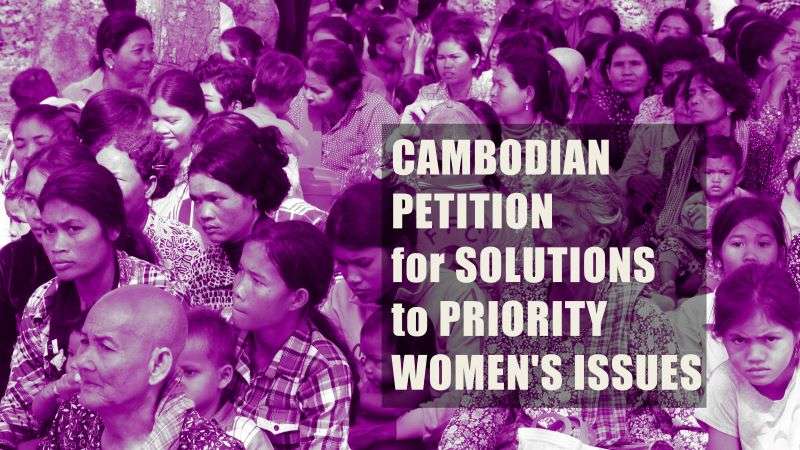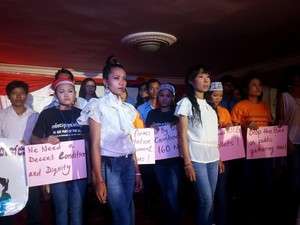To commemorate the 108th International Women’s Day, we, trade unions, associations and civil society organizations working to promote women’s rights and gender equality, as well as citizens in the Kingdom of Cambodia, would like to propose to the Royal Government of Cambodia—especially, Ministry of Women’s Affairs (MoWA), Ministry of Labor and Vocational Training (MoLVT), Ministry of Interior (MOI), Ministry of Foreign Affairs and International Cooperation (MFAIC), Committee to Combat Trafficking in Persons, Council of Ministers (CoM)—and private sector to strive even further to respond to the necessary and urgent demands of women in order to eliminate all forms of violence against women, and to realize national policies and strategies aimed at reducing gender inequality and poverty in Cambodia.
We would like to highlight seven priority demands for women, for which we would like to encourage relevant ministries to provide solutions:
The following are details of the above demands, and specific requests of women.
Demand #1: Provide community preschools and day-care centers at the workplace
- Female workers and women in the informal economy face numerous challenges during their street vending and working hours. They must place their children on the pulling carts, carry their children while working, leave their children with neighbors or leave small children and infants alone at home. This could affect the safety, health and development of the children.
According to Article 186 of the Law on Labor, managers of enterprises employing a minimum of one hundred women or girls shall set up, within their establishments or nearby, a nursing room and a day care center. However, most workplaces have not yet established these centres.
- Ministry of Labor should strictly require all enterprises employing a minimum of one hundred employees to build a quality day-care center.
- Ministry of Labor and Ministry of Education should create day-care centers for children aged 18 months up and community preschools in all communes/Sangkats.
Demand #2: Provide safe shelters for women suffering from domestic violence and for women domestic workers.
- When women suffer from domestic violence or when domestic workers suffer from violence carried out by house owners, survivors very often cannot afford to stay away from the perpetrators and do not have access to safe shelter to protect themselves. These grants perpetrators continued opportunity to threaten, harass and to use violence against the victims.
- Some local authorities still have gaps in the implementation of appropriate response mechanisms to protect victims in accordance with procedure. A lack of adequate interventions or responses to gender-based violence mean that women are more likely to remain under the control of the perpetrator and continue to suffer abuse.
- The government should push for the creation of one stop service centers for victims of gender-based violence. Services provided should be of good quality, including psychological counselling, legal consultation and protection, physical healthcare, provision of safe shelter, and security protection to women victims and their children.
- The government should work to establish and maintain a functional hotline system that victims or eye-witnesses can report incidents to without fear, and a guarantee of confidentiality of the identity of those reporting. Officials in charge of information should be equipped with suitable skills and refer to related services immediately.
- Authorities should be active in their roles to support victims, ensuring their ability to file complaints to the court and their right to request protection orders.
Demand #3: Stop sexual harassment and violence against women workers at the workplace
- Women workers in the entertainment industry, namely masseuses, beers promoters, casino workers and housekeepers at guesthouses or hotels face sexual harassment, sexual assault and violence from clients, supervisors or employers at their workplaces. So far there have been limited solutions for these workers. Indeed, they are often told to ‘put up’ with the violence, or face dismissal from work.
- The perpetrators often face punishment solely in the form of paying civil compensation to victims in exchange for having the case closed and setting them free from criminal responsibility. This widespread practice shows weaknesses in law enforcement and perpetuates ongoing cycles of violence against women.
- Some hidden practices across the entertainment sector violate the rights of female employees. For instance, there is a widely used though unwritten policy that women working in entertainment establishments including KTV parlors are required by the employer or supervisors to take regular pregnancy tests and, if found positive, they are required to have an abortion, or they will have their employment terminated.
- Government should introduce a policy requiring all entertainment establishments to take steps to combat all forms of harassment and violence against women, by taking into consideration the rights, welfare and dignity of workers before profit.
- Inter-ministerial working group responsible for occupational health and safety should regularly monitor all enterprises to ensure that there are sufficient anti-harassment and anti-violence policies at the workplace and to provide immediate interventions to push for employers to effectively implement the policy.
- NSSF should push for all entertainment establishments especially KTV and massage parlors to have their employees registered with NSSF.
- Labor inspectors should review and monitor all entertainment establishments to ensure protections, including zero tolerance of fored pregnancy testing, coerced or forced abortions or unfair dismissals or other discrimination against pregnant workers. Employers found to be who mistreating women workers should be appropriately punished.
Demand #4: Take action to stop the use of violence against women human rights defenders
- Local authorities have often failed to create opportunities for stakeholders to meet and discuss issues in order to seek proper and timely solutions. There have also been threats by a number of actors and the use of physical and mental violence targeting women human right defenders, including by intentionally obstructing public meetings and marches to demand justice for their issues.
- There have been uses of the judicial system as a tool to pressure and silence the voices of women human right defenders, by means of placing them under judicial investigation, arresting them and/ or charging them with, for instance, defamation or damage of private property
- The government should urge for strict law enforcement, in compliance with principles of universal human rights and the promotion of fundamental rights and freedoms including rights to expression, rights to assembly, right to unionize, right to participation and right to association without harassment, surveillance and interference from competent authorities or officials.
Demand #5: Reform the transportation system for workers, especially those in the textile, garment and footwear industries
- Accidents have increasingly occurred on unsafe trucks transporting workers to and from factories. Those trucks have not been regularly checked for technical compliance and have not installed safe seats meaning that workers have to stand in overcrowded ‘cages’ and risk the possibility of sexual harassment and drunk drivers.
- NSSF report shows that 563 workers were injured and 10 were killed as of the first semester of 2018. This report also reveals that about 20% of the drivers in garment industry do not have a driving license.
- The government should develop a policy on a safe transportation system for workers in the textile, garment and footwear industries, which provides for trucks or other modes of transportation which ensure the comfort and safety for workers or which alternatively requires employers to be responsible for providing quality transportation service for workers.
Demand #6: Improve working conditions and strengthen mechanisms to protect domestic workers
- The number of domestic workers in Cambodia is estimated at some 250,000, a majority of which are women. However, domestic work is not covered by the Labor Law.
- The Ministry of Labor issued a Prakas 235 on 29 May 2018 on Working Conditions for Domestic Workers, which provides in Article 13 that employers have a duty to register domestic workers for NSSF on work accident, health care and pension. However, most employers have not yet complied with the Prakas. Additionally, this Prakas still has some gaps as it does not provide for a basic salary, employment contracts between domestic workers and employers, maternity leave or public holidays.
- Ministry of Labor should urge employers to register their domestic workers with NSSF, in accordance with Article 13 of the Ministry’s Prakas 235 on Working Conditions of Domestic Workers.
- Ministry of Labor should create a format of written contract between employers and domestic workers, in compliance with working conditions, respect of labor rights and protection for other benefits.
- Ministry of Labor should set a minimum wage for domestic workers.
- The government should ratify ILO Convention 189 on Protection of Domestic Workers, so that domestic workers within Cambodia and working abroad have their rights and benefits protected.
Demand #7: Strengthen mechanisms to protect migrant workers from exploitation, human trafficking and modern slavery
- There is a lack of system to report or access information, rescue or intervene when workers are subjected to rights abuse, including sexual violence and assaults.
- Overseas domestic workers have not received social protection.
- There is not yet a monitoring system to oversee the working conditions, health and safety of migrant workers
- Women domestic workers have in many cases been deprived of the right to maintain possession of their official documents including passports and have been denied the right to use a telephone.
- Ministry of Labor should establish a database system to record information about Cambodian laborers working in China and Malaysia, including an accurate record of the number of Cambodian women laborers working in those countries
- Cambodian embassies or consulates should also have clear data about the number of Cambodian laborers, their work addresses and accommodation addresses, so that interventions can be provided on time when they face any problems
- Cambodian embassies and consulates should establish rapid-response centers for workers in trouble, including the provision of food, temporary shelters and consultancy services and they should organize to meet with migrant workers at least twice a year
- The government should create a committee to monitor and evaluate the process of sending workers overseas on a quarterly basis to ensure that the interstate MOU is being implemented appropriately, especially to ensure that domestic workers are receiving social protection and have the right to possess their personal documents.








